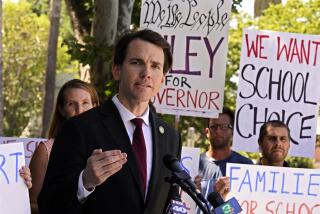Pounding ‘The Hammer’
- Share via
Congress can draw up all the sonorous ethics and election rules it wants. Without enforcement, they’re meaningless, a word that for years applied to the should-be internal watchdogs of the congressional ethics committees and to the Federal Election Commission, whose no-nonsense name belies its domination by the two major political parties.
No wonder there were headlines and general amazement when the House Ethics Committee showed some independence in rebuking Majority Leader Tom DeLay for multiple transgressions. At the FEC, no backbone is yet evident, but a federal judge is doing her best to insert one.
One thing DeLay (R-Texas) has come by honestly is his favorite moniker, “The Hammer.” He doesn’t hesitate to make life miserable for colleagues seeking a favor such as a committee post or party support for reelection.
That increased the surprise when the Ethics Committee, headed by Rep. Joel Hefley (R-Colo.), raised its head. It chastised DeLay for sending his proxies to threaten Rep. Nick Smith: Unless Smith, a Republican from Michigan, voted for the Bush administration’s prescription drug bill, DeLay would see to it that Smith’s son, who was running for his retiring father’s seat in Congress, lost his primary bid. Smith disobeyed, and his son lost.
The committee also condemned DeLay for misusing the Federal Aviation Administration to corral Democrats in the Texas Legislature who had left the state to disrupt the legally questionable redrawing of the state’s congressional map.
The Ethics Committee only slapped DeLay’s wrist. But if the stink it raised doesn’t dissipate, DeLay might lose his post as majority leader. DeLay is also looking at trouble in his home state. Criminal indictments for alleged illegal fundraising have been issued by a Texas grand jury against three of DeLay’s cronies and eight corporations. The $2.5 million they raised helped the Republicans to conquer the statehouse in 2002 and concoct a map of legislative districts so bizarre that the U.S. Supreme Court on Monday told federal judges in Texas to review it again.
Unfortunately, the FEC doesn’t have a chief executive like Hefley. Instead, it has Bush appointee Bradley A. Smith, an outspoken foe of campaign finance reform who has done everything in the FEC’s power, and then some, to subvert the McCain-Feingold campaign finance reform legislation passed by Congress in 2002. It’s no accident that the presidential election campaigns have crossed the billion-dollar spending mark, much of it flowing through unregulated partisan committees.
U.S. District Judge Colleen Kollar-Kotelly is trying to change that. Last month she struck down the core of the regulations concocted by the FEC to eviscerate campaign reform, and Tuesday she rejected a request by the commission for a stay of her order.
Her words were unusually harsh. She called the FEC a “super-legislature disregarding congressional intent” and seeking “to thwart the very essence of the wide-sweeping system of reform enacted by Congress.” Kollar-Kotelly’s decisions give notice that Smith and his colleagues aren’t quite as all-powerful as they thought they were. Just like Tom DeLay.
More to Read
Get the L.A. Times Politics newsletter
Deeply reported insights into legislation, politics and policy from Sacramento, Washington and beyond. In your inbox twice per week.
You may occasionally receive promotional content from the Los Angeles Times.










